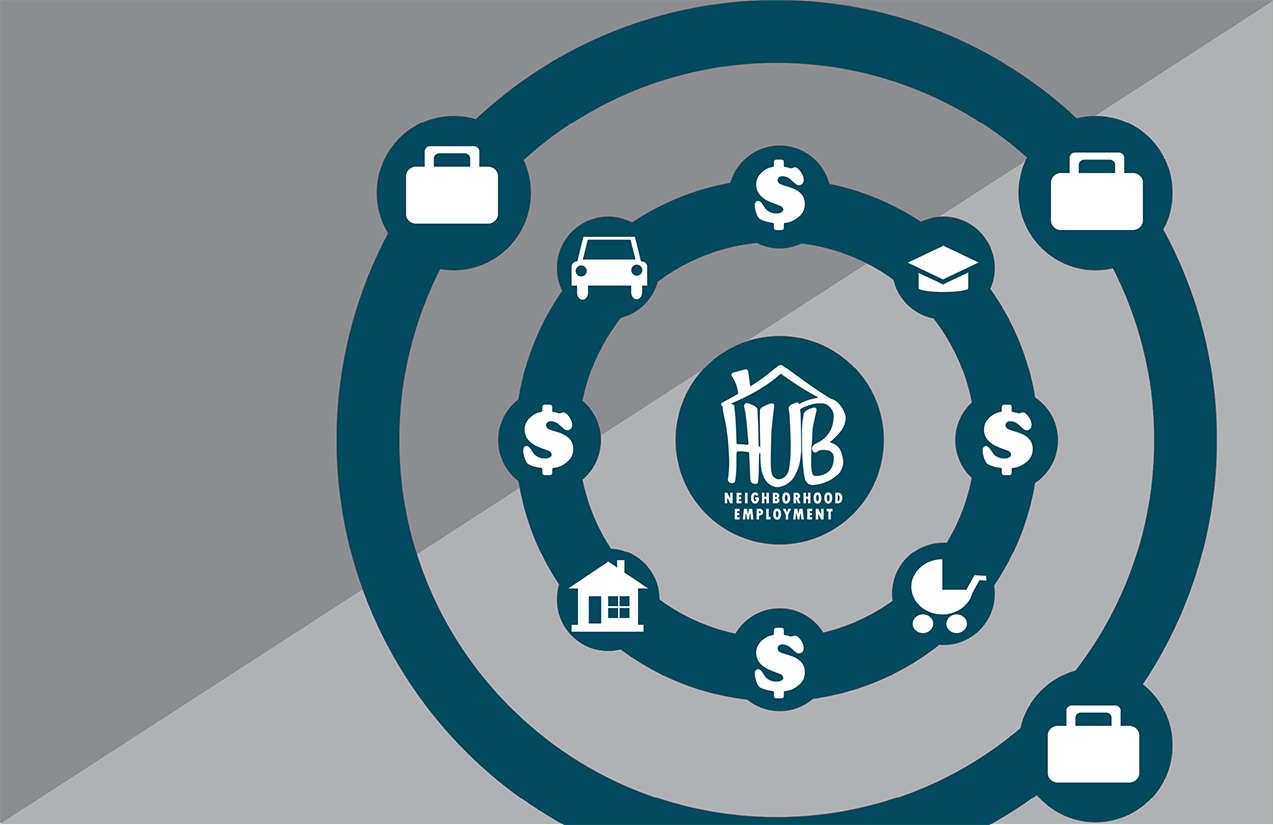
by Kathleen Bolter
Distressed neighborhoods pose a vexing challenge for policymakers. Even when the broader area is doing well, residents of distressed neighborhoods can still find themselves unemployed or stuck in bad jobs. Fifty-five million Americans live in distressed neighborhoods, where the unemployment rate is much higher than in the rest of their local labor market.
While one controversial solution to this issue is to incentivize businesses to create jobs in distressed neighborhoods, it is difficult to guarantee that the jobs created will be good jobs—providing stable incomes and a high quality of life—or that the jobs themselves will even be filled by neighborhood residents. Another, more promising solution for helping the individuals living in distressed neighborhoods access good jobs in their wider community is to centralize the training and access to services needed to find good jobs directly in the neighborhoods where individuals live. This is the basic concept behind the Neighborhood Employment Hubs.

Neighborhood Employment Hubs (or Hubs) began in 2018 in Battle Creek, Michigan, and aim to create more opportunity for residents in marginalized communities by creating stronger pathways to good jobs. Operated by Michigan Works! Southwest, the regional workforce development agency, Hubs are intentionally embedded in community organizations operating in distressed neighborhoods. A key goal is to reach potential workers who may be disconnected from traditional employment agencies and other community resources.
The Hubs are open to the public Monday through Thursday from 9:00 a.m. to 4:30 p.m., with all adult residents eligible to receive services. After filling out an application and completing a short orientation, clients are asked to describe both their barriers to employment and their training goals.
Although the Hubs program is only four years old, practitioners have already learned several lessons for policymakers wanting to improve employment in distressed neighborhoods.
Before beginning any training, focus on eliminating barriers to employment.
Many residents face numerous barriers to finding and keeping good jobs, ranging from lack of child care and transportation to being unable to afford appropriate equipment or clothing for a job. Understanding and helping people overcome these and other barriers to employment is essential to successful job training programs, and Hubs tackle these issues as priority.
A flexible funding model allows for important barriers to be addressed.
State and federal government funding often comes with restrictions on how money can be spent on program activities. Because the Hubs are primarily funded from a private grant from the W.K. Kellogg Foundation, funding has more flexibility to implement innovative approaches to support individuals seeking services. For example, someone may have a car but cannot legally drive it because it is uninsured. Rather than have the individual face fines and license suspension, further reducing the chances of the individual attaining or keeping a job, the Hubs can help their client find and finance insurance. Assistance with financing insurance is generally not offered in most publicly funded job training programs.
Building long-term relationships creates trust within the community.
Trust built on developing long-term relationships is another key feature of Hubs. Customers typically work with Hubs staff for over 12 months, if not longer, helping to develop rapport. Moreover, Hubs staff participate in community activities within the neighborhood, often living nearby, helping to build trust and accessibility among customers. This relationship building makes it easier for Hubs staff to help customers find matches for both additional community support services and jobs that will be a good fit. Hubs serve a social capital building approach. Word-of-mouth is central to this model, as Hubs target people who otherwise would not be aware of available services or readily trust area service providers.
Coordination and alignment among service providers is essential for maximizing the impact of workforce development systems.
The Hubs operate within the framework of a workforce consortium that includes the local Goodwill Industries affiliate, Kellogg Community College, Michigan Works! Southwest, and Woman’s Co-op. To better serve target communities, this consortium coordinates and aligns resources, reducing the need for customers to repeat intake forms, speak with multiple representatives, or otherwise get lost in the shuffle. The greater efficiency from coordination has allowed the consortium to expand job preparation, training, and support services to customers. While the Hubs’ initial goal in the first three years was to provide services to 700 people, the program helped eliminate barriers and provide training for 1,400.
Business partners also need to be part of the program.
While alignment between workforce partners has been successful, engaging business partners has been a more enduring challenge. Here, too, relationships matter. Hubs coaches play a large role in helping customers find specific jobs and businesses where they will be successful, using their own local knowledge to pair customers with employment opportunities that provide a welcoming work environment capable of meeting individual needs. Hubs staff work to understand business needs and have been instrumental in developing trusted partnerships with businesses so that culture and process improvements such as HireReach have been adopted. This approach broadens the pool of applicants and can deepen the pipeline of employment opportunities. In turn, this buy-in rests on relationships with Hubs staff and demonstrated success of assisted job seekers and business partners, both of which take time to build.
Neighborhood Employment Hubs represent an innovative approach to help residents in distressed neighborhoods find—and keep—good jobs. By eliminating barriers, building long-term relationships, and collaborating with other community partners, the Hubs offer a way to borrow some of the more successful elements from private training programs while leveraging the greater scale of public funding to redefine employment service delivery.
(Thank you to the following people for their insights into the Neighborhood Employment Hubs: Jakki Bungart-Bibb, Director of Michigan Works! Southwest; Cherise Buchanan, Neighborhood Employment Hubs Project Manager; Barb Travis, Lead Career Coach, Neighborhood Employment Hubs; Heather Ignash, Business Services Coordinator-Calhoun County and Julie Klein, Career Coach/Business Services Liaison, Neighborhood Employment Hubs.)
